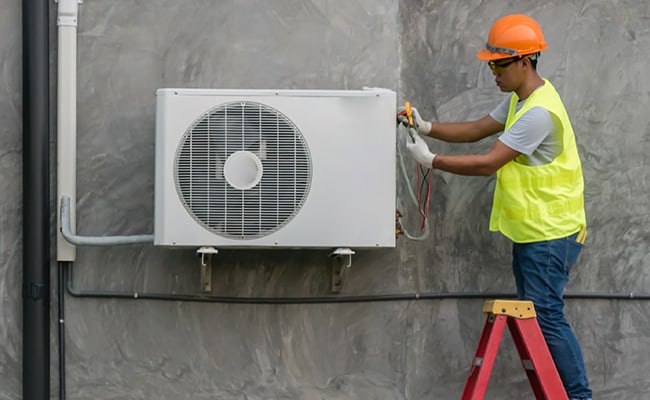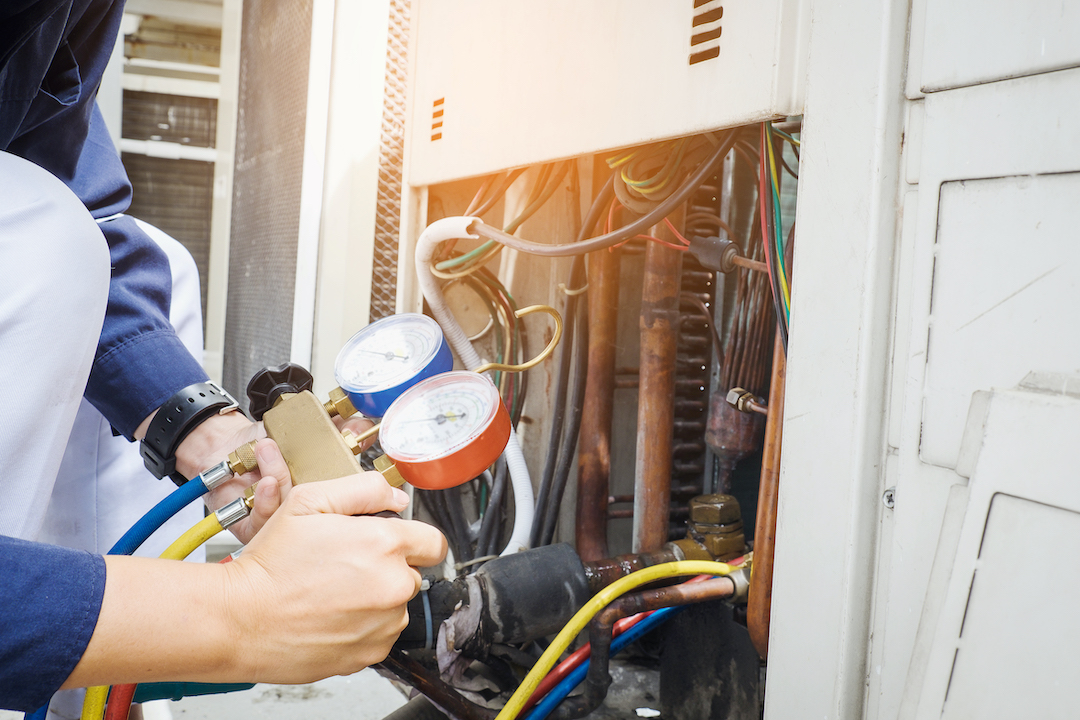Red Flags Your Home Needs Immediate heat pump service
Red Flags Your Home Needs Immediate heat pump service
Blog Article
Choosing Between a Warmth Pump and Furnace: Key Factors To Consider for Your A/c Requirements
When examining heating options for a/c needs, the choice in between a warm pump and a heating system can be complex. Each system supplies distinctive advantages tailored to details environments and energy efficiency objectives. Comprehending these distinctions is important for making an educated option. Trick variables such as installation costs and environmental influence better complicate the option procedure. Which option truly straightens with one's comfort and sustainability choices? The complying with sections will certainly explore these factors to consider thoroughly.
Understanding Warmth Pumps: How They Work and Their Advantages
While numerous homeowners think about numerous home heating choices, understanding exactly how heat pumps function and their benefits can considerably affect their decision. Warmth pumps operate by transferring warmth as opposed to creating it. In the winter, they draw out warmth from the outside air or ground and move it indoors, while in the summertime, they reverse this procedure, cooling the home by getting rid of warmth outside. This double functionality makes them functional for year-round climate control.One of the main benefits of heatpump is their energy efficiency. They make use of considerably less electricity compared to standard heating unit, potentially causing lower utility expenses (ductless mini splits). Furthermore, warmth pumps have a smaller carbon footprint, making them an ecologically friendly selection. They likewise call for less maintenance than standard systems, adding to long-term price financial savings. On the whole, recognizing the auto mechanics and benefits of warmth pumps can aid home owners make informed decisions regarding their home heating and cooling down needs
Checking Out Heating Systems: Types, Operation, and Advantages
Furnaces come in different types, including gas, electrical, and oil designs, each with unique operational devices. Comprehending these differences is necessary, as they impact effectiveness and heating efficiency. In addition, heaters supply countless benefits, such as regular warmth outcome and reliability in colder climates.
Kinds of Heaters
Heater can vary substantially in design and procedure, with heating systems being a prominent choice amongst property owners. There are a number of kinds of heaters, each using different fuel resources and technologies. Gas furnaces prevail, leveraging all-natural gas to create warm efficiently. Electric furnaces, on the various other hand, use electric resistance to generate warmth, often favored for their straightforward installment. Oil heaters, while much less common, are reliable in areas with limited gas accessibility (heat pump replacement ooltewah tn). Furthermore, condensing heaters take full advantage of power efficiency by recording and reusing exhaust gases. Each kind operates with a system of warm exchangers and ductwork to disperse cozy air throughout a home. Understanding the distinctions in between these heating system types is essential for informed heating and cooling choices
Advantages of Furnaces
For property owners looking for trusted warmth during cool months, the advantages of heaters are significant. Furnaces supply consistent home heating, making sure even temperatures throughout the home. They are especially efficient in severe cool, typically outmatching heat pumps in frigid conditions. Various kinds, consisting of gas, electric, and oil heating systems, supply flexibility to meet diverse requirements and preferences.Furnaces likewise have a tendency to have reduced first setup costs contrasted to heatpump, making them a much more available option for many. Their durable design adds to a longer lifespan, with numerous units lasting over 15 years with proper maintenance. Additionally, modern furnaces are frequently furnished with advanced technology for improved performance, which can bring about lowered power expenses. Generally, heating systems remain a reliable choice for reliable home heating.

Power Effectiveness: Contrasting Warmth Pumps and Furnaces
When contrasting power efficiency between warmth pumps and furnaces, the Seasonal Energy Performance Proportion (SEER) plays a necessary duty in identifying efficiency. In addition, an operational cost analysis discloses the lasting monetary implications of each system. Understanding these factors can direct house owners in making educated choices about their heating services.
Seasonal Energy Effectiveness Proportion
Power performance plays an essential role in the decision-making process between warm pumps and heating systems, especially when taking into consideration the Seasonal Power Performance Proportion (SEER) This statistics actions the cooling performance of heat pumps over an entire cooling period, providing a standardized means to examine performance. Higher SEER ratings indicate greater power performance, equating to reduced power consumption and minimized energy costs. In comparison, heaters are generally evaluated using the Annual Gas Application Performance (AFUE) score, which shows heating performance. When comparing these two systems, home owners ought to focus on SEER ratings for heatpump, as they straight influence general energy savings and environmental sustainability. An extensive understanding of SEER can significantly affect the long-lasting complete satisfaction and cost-effectiveness of the chosen HVAC option.
Operational Price Analysis
Understanding the functional expenses associated with warmth pumps and heaters is vital for home owners examining their options. Heatpump commonly use higher power efficiency, transforming electrical energy right into warm with marginal waste. This leads to reduced regular monthly energy bills, specifically in moderate environments. On the other hand, typical heating systems, particularly gas designs, might have lower in advance expenses but can incur higher functional expenditures with time because of sustain prices and effectiveness ratings.Moreover, warmth pumps can function as both home heating and cooling down systems, potentially minimizing the demand for separate a/c units. While preliminary financial investments for heat pumps may be greater, their lasting savings in energy performance can make them an extra cost-efficient option for many families. Careful evaluation of neighborhood energy rates is vital to identify the finest alternative.
Installment Costs: What to Expect for every Heating System
Setup expenses for home heating systems can differ substantially in between heatpump and furnaces, influencing home owners' choices. Heat pumps usually have higher ahead of time setup costs, commonly ranging from $3,500 to $8,000, depending upon the system size and complexity of installation. This includes the outside system, indoor handling system, and required ductwork modifications. Conversely, furnaces tend to have reduced first prices, balancing between $2,500 and $6,000, which can be appealing for budget-conscious property owners. Nevertheless, installation expenses can raise if considerable ductwork is required.Moreover, the selection of gas kind for furnaces-- natural gas, gas, or electric-- can likewise affect installment costs. While heatpump offer energy effectiveness, their first investment may prevent some customers. Inevitably, examining installation prices together with long-term financial savings and effectiveness will certainly help house owners in making informed choices about their home heating systems.
Climate Factors To Consider: Which System Does Better in Your Location
How do environment problems influence the effectiveness of heater? The performance of heatpump and furnaces can vary greatly depending upon the local environment. In modest climates, warmth pumps excel by successfully transferring warm from the outdoors air, making them an energy-saving choice. Their efficiency reduces in exceptionally cold temperatures, where they might have a hard time to draw out enough heat. Alternatively, heating systems, especially gas versions, offer trusted and consistent warmth despite outdoor conditions, making them more effective in chillier regions.In locations that experience milder wintertimes, warmth pumps can run effectively year-round, offering both cooling and heating. In comparison, areas with extreme winters months frequently benefit from the effectiveness of heaters. Inevitably, understanding the local climate is vital when making a decision in between a warmth pump and a heater, as it straight influences their functional performance and total efficiency.
Upkeep Demands: Long-Term Take Care Of Warmth Pumps vs. Furnaces
While both warmth pumps and heating systems require normal maintenance to guarantee peak efficiency, their particular needs and treatment routines vary considerably. Furnaces usually need much less frequent focus, with annual examinations being enough to look for gas leakages, clean filters, and analyze general capability. Their easier design usually enables for uncomplicated repairs.In contrast, warmth pumps necessitate semiannual maintenance because of their twin function in heating & cooling. This consists of cleansing coils, examining refrigerant levels, and making sure that both the outside and indoor systems work at their finest. In addition, heatpump maintenance frequently entails more complex elements, making professional servicing essential.Neglecting maintenance can cause decreased efficiency and increased power expenses for both systems. Inevitably, property owners need to take into consideration these long-lasting treatment needs when choosing between a warmth pump and a furnace, as proactive maintenance can extend the lifespan and performance of either system substantially.
Environmental Effect: Selecting a Lasting Heating Choice
The ecological influence of furnace is a vital examination for home owners looking for sustainable alternatives. Heatpump are normally much more energy-efficient than typical heaters, as they transfer heat as opposed to produce it, considerably minimizing carbon discharges. By making use of eco-friendly power resources, such as air-source or geothermal warmth pumps, home owners can further check this site out minimize their environmental footprint.On the other hand, gas furnaces send out greenhouse gases and contribute to air pollution, though they frequently supply greater warm result. Nevertheless, advancements in modern technology have actually resulted in the growth of high-efficiency furnaces that decrease emissions.Ultimately, picking a heating system entails evaluating efficiency against ecological impact. Homeowners are encouraged to assess neighborhood energy sources and motivations for eco-friendly systems, making certain a selection that aligns with both personal comfort and ecological responsibility. The choice affects not just prompt convenience yet also lasting sustainability and ecological health.
Often Asked Questions
The Length Of Time Do Warm Pumps and Furnaces Usually Last?
The life expectancy browse around here of warm pumps generally varies from 15 to twenty years, while furnaces can last between 15 to thirty years. Regular maintenance substantially impacts their long life and performance in offering home heating services.
Can I Make Use Of a Heat Pump in Exceptionally Cold Climates?
Warmth pumps can run in very cool climates, yet their effectiveness diminishes as temperature levels decrease. In such problems, supplementary heating resources may be needed to keep comfy interior temperatures and guarantee peak efficiency.

What Is the Sound Level of Warm Pumps Versus Furnaces?
The noise levels of heat pumps and heating systems vary substantially. Normally, heatpump operate even more quietly than typical heating systems, making them more effective for those conscious seem, while furnaces may generate louder operational sounds throughout heating cycles.
Are Heat Pumps Suitable for Both Heating & Cooling?
Heatpump are indeed suitable for both heating & cooling (ductless mini splits). They operate by transferring warmth, providing reliable temperature control year-round, making them a functional selection for homeowners seeking an all-in-one cooling and heating service
What Size Heating System Do I Required for My Home?
Identifying the appropriate dimension furnace for a home needs evaluating variables such as square video footage, insulation top quality, local climate, and the home's format. Consulting a specialist can ensure an exact analysis and optimal convenience. Heat pumps typically supply greater power efficiency, transforming electrical power into warmth with marginal waste. In moderate environments, warm pumps stand out by successfully moving heat from the outdoors air, making them an energy-saving option. On the other hand, heaters, particularly gas versions, provide trusted and consistent warmth no matter of outdoor conditions, making them better in colder regions.In areas that experience milder winter seasons, warmth pumps can operate successfully year-round, supplying both home heating and cooling. Warmth pumps are generally much more energy-efficient than conventional furnaces, as they transfer heat instead than generate it, significantly minimizing carbon discharges. By using eco-friendly power sources, such as geothermal or air-source heat pumps, property owners can additionally decrease their eco-friendly footprint.On the other hand, natural gas heating systems Visit This Link release greenhouse gases and contribute to air pollution, though they frequently provide greater heat outcome.
Report this page